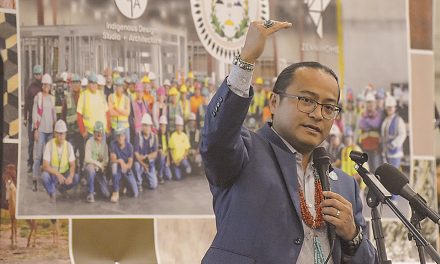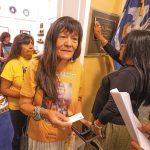
High court: Deputy AG illegally practicing law
WINDOW ROCK
What was explained as an honest mistake the Navajo Nation Supreme Court considers unlawfully practicing law — and it could impact the deputy attorney general’s ability to practice law on Navajo.
A month after the Navajo Nation Council approved legislation appointing Kimberly Dutcher as Navajo Nation deputy attorney general, Dutcher went before the Supreme Court for a hearing about her signature on a petition exempting 36 attorneys employed by the Department of Justice from pro bono appointment as public defenders.
The Navajo Nation rotates tribal attorneys to represent indigent defendants who don’t have the means to obtain other counsel.
This action came under scrutiny because Dutcher, although having passed the Navajo Bar in August 2019 and fulfilled all requirements in October to become a member of the Navajo Nation Bar Association, is not yet a member.
The Supreme Court concluded her signature on the petition amounted to practicing law without a license.
“Petitioner signed alone and made conclusions of law as to application of the Navajo Nation Pro Bono Rules to herself other DOJ staff. Petitioner is not admitted to practice law within this jurisdiction and is technically practicing law without a license is violation of Navajo law,” stated a Nov. 4 Supreme Court opinion.
During a Nov. 15 Supreme Court hearing on Dutcher’s admission to the bar, Dutcher apologized for signing the memo, which she said she did when Attorney General Doreen McPaul was unavailable.
She said it was done an administrative act for the purpose of providing information to the Office of Pro Bono Services, and had she known the court would have seen it as anything more, she would never have signed it.
She did not write the memo, she told the court, but rather the court staff did.
“I’ve been an Arizona attorney for 17 years and never been disciplined by any state, federal or tribal court,” Dutcher told the justices. “I recognize now that signing that September 9, 2019, memo without review was a mistake and I take responsibility for that mistake.”
In October, the Navajo Nation Bar Association filed a petition on behalf of Dutcher for admission to practice law on Navajo. Because of the issue surrounding the memo, the Supreme Court put the admission on hold until they could resolve the other issue first.
Attorney General Doreen McPaul filed an expedited motion to dismiss the action and the Supreme Court denied this.
The court stated this petition presented four major issues: whether the determination of exemption from pro bono appointment is a legal decision; whether all DOJ attorneys are prosecutors and presenting officers and therefore entitled to a blanket exemption; whether named staff at DOJ are exempt from mandatory pro bono service; and whether Dutcher’s petition can be considered unauthorized practice of law.
“The determination of exemption is a legal decision that rests solely with the judicial branch, specifically with the Navajo Nation Supreme Court,” stated the opinion.
Troy Eid, president of the Navajo Nation Bar Association, spoke in defense of Dutcher’s admittance.
He said she met the qualifications, completed the requirements and passed the eight-hour exam with a high score. Along with Dutcher, Eid petitioned the Supreme Court to consider admitting 11 other individuals into the association.
“When she is admitted, if she is admitted, I hope she will be, we will welcome her as a new bar member,” said Eid. “We don’t have enough bar members in Navajo who have the qualifications and background as Ms. Dutcher.”
All regular members of the NNBA and other persons permitted to practice in the Navajo Nation courts are subject to and must accept pro bono appointments. The only exemptions are the attorney general, chief legislative counsel, employees of the Judicial Branch ]and all Navajo Nation prosecutors and presenting officers.
Asked by Chief Justice JoAnne Jayne whether or not he took into consideration Navajo customs and traditions in regard to both Navajo leaders and Dutcher practicing law on Navajo, Eid said that he did.
“I’ve studied with traditional practitioners and tried to understand as a non-Navajo what it actually means to be a naataanii,” said Eid, who also represented pro-bono former Speaker Johnny Naize.
“All the great naataaniis I read about … there were a lot of mistakes great leaders made,” he said. “No one expected them to be perfect. They did expect … them to learn, listen and take responsibility.”
Dutcher, who is originally from Fort Defiance, received her law degree from Arizona State University’s Sandra Day O’Connor College of Law. Her expansive resume also includes court solicitor for the Salt River Pima-Maricopa Indian Community.
Her career includes serving as the executive director of the Association on American Indian Affairs and serving the Gila River Indian Community for 10 years as a prosecutor, senior assistant general counsel, and division manager.
“I am looking forward to engaging in biyaatí with the court and restoring harmony,” Dutcher said in a written statement after the hearing.








 Highway 264,
Highway 264, I-40, WB @ Winslow
I-40, WB @ Winslow